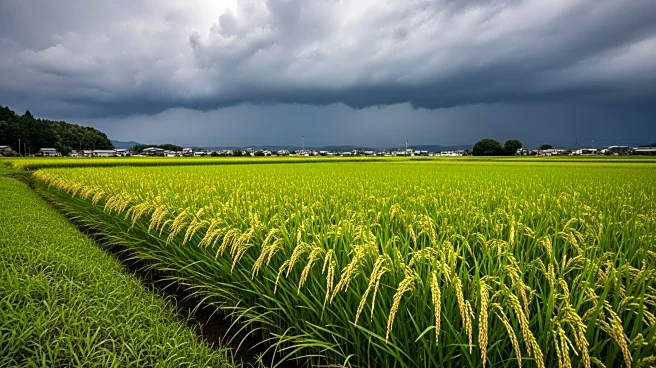What's Happening?
Japan's agriculture ministry has reported that the country's calorie-based food self-sufficiency rate remained at 38% for fiscal year 2024, marking the fourth consecutive year without change. This stagnation is attributed to adverse weather conditions, including downpours and droughts in southwestern and western regions, which have negatively impacted wheat and soybean production. Despite an increase in per-capita consumption of rice, which is 99% self-sufficient, and growth in domestic production of sugar beets and sugarcane, the overall proportion of domestic production to total food supply remains significantly below the fiscal 2030 target of 45%. The cabinet of Prime Minister Shigeru Ishiba has upheld this target, emphasizing the need for improved productivity and expanded production.
Why It's Important?
The stagnation in Japan's food self-sufficiency rate highlights ongoing challenges in achieving food security, a critical issue for the nation. With a target of 45% self-sufficiency by 2030, the current rate of 38% underscores the need for strategic interventions to boost domestic production. This situation is significant as it affects Japan's ability to reduce dependency on food imports, which can be vulnerable to global market fluctuations and geopolitical tensions. Enhancing food self-sufficiency is crucial for ensuring stable food supply and economic resilience, particularly in the face of climate-related disruptions.
What's Next?
To address the stagnant food self-sufficiency rate, Japan's agriculture ministry may need to implement policies that focus on increasing agricultural productivity and resilience against adverse weather conditions. This could involve investing in technology and infrastructure to support farmers, as well as developing strategies to mitigate the impact of climate change on agriculture. Stakeholders, including policymakers and agricultural experts, are likely to engage in discussions to explore innovative solutions and partnerships that can help achieve the 2030 target.
Beyond the Headlines
The issue of food self-sufficiency in Japan also raises broader questions about sustainable agricultural practices and environmental stewardship. As climate change continues to pose challenges to traditional farming methods, there is a growing need to adopt practices that enhance soil health and water management. This could lead to a shift towards more sustainable and climate-resilient agricultural systems, which not only support food security but also contribute to environmental conservation.









